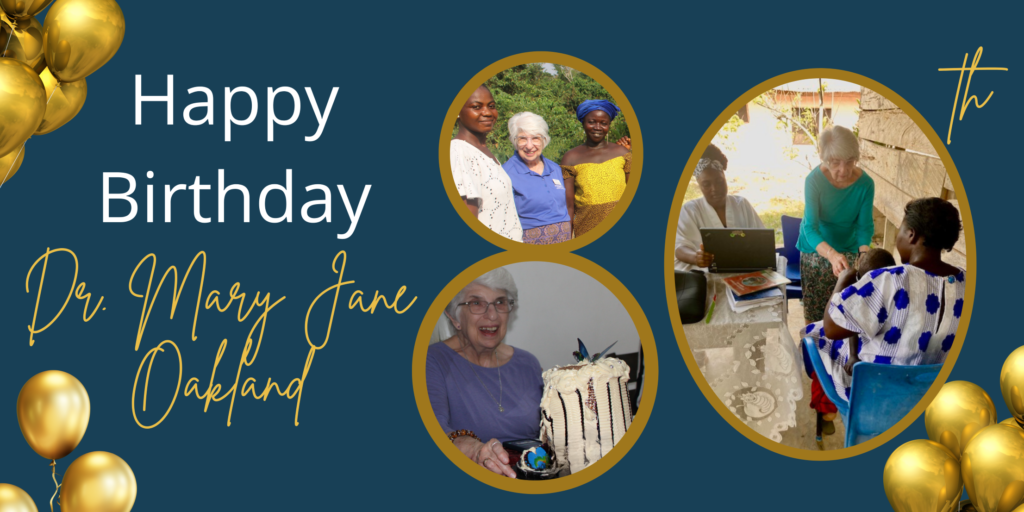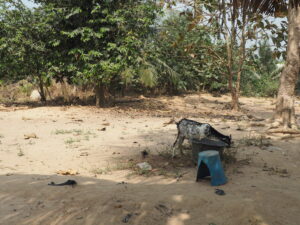
Bio-fortified Bean Distribution Marks a New Chapter in Self-Help’s Fight Against Hunger and Malnutrition
By Jorge Campos Solis, Country Director, Self-Help Nicaragua and Jerry Perkins, member of the board of directors, Self-Help International
This post goes with another post by Self-Help Board Member, Jerry Perkins.

Farmers remove weeds from a field of Rendidor beans.
Los Chiles, Nicaragua– Self-Help International Nicaragua began a new chapter in its agricultural development program in November 2019 when, for the first time, 450 pounds of beans that have been bio-fortified with extra iron and zinc were distributed to 30 farmers in the Los Chiles region in southeastern Nicaragua. Harvest of the beans is expected to begin in March.
Another 50 pounds of the bio-fortified beans, which are named “Rendidor” in Spanish, have been planted on two Self-Help demonstration and experimental plots.
The Rendidor bio-fortified beans represent the first new crop introduced by Self-Help Nicaragua since 1999, when Self-Help began working in Nicaragua with the planting of Quality Protein Maize (QPM), a high-protein corn variety that was developed at the International Maize and Wheat Improvement Center (CIMMYT) in Mexico.
QPM was brought to Nicaragua by Self-Help soon after Hurricane Mitch decimated much of Central America’s agricultural infrastructure between Oct. 22 and Nov. 9, 1998, when it became the second-deadliest Atlantic hurricane on record.
The Benefits of Bio-fortified
This year, Self-Help will distribute bio-fortified rice to its cooperating farmers to strengthen its mission of addressing hunger and malnutrition among the most vulnerable people living in both urban and rural areas. Especially affected by the scarcity in the quantity and quality of food are women, children, and the elderly who do not receive the micro-nutrients they need to lead healthy and productive lives.
QPM was introduced by Self-Help because it has a higher level of protein than conventional corn varieties that have traditionally been grown in Nicaragua. Numerous studies have shown that the higher protein level of QPM improves the physical and mental development of children and young people, which makes them more productive in adulthood.

Rendidor beans yield more per acre when they are planted in the double-row method that is used by farmers who cooperate with Self-Help Nicaragua.
It has 90% of the protein found in skim milk, which makes it an ideal way for people, especially children, to get a higher intake of protein when they consume tortillas and other corn-based food products made from QPM. QPM also yields more per acre and people say they like its taste.
The new bio-fortified bean seeds that have been distributed by Self-Help will expand the organization’s mission to provide farmers and consumers with an improved diet. Rendidor beans contain 60% more iron (86 parts per million, or ppm) and 50% more zinc (43 ppm) compared to the traditional bean varieties (frijoles criollos) grown in Nicaragua. The improved nutritional content of the bio-fortified beans has been confirmed in nutritional studies, according to the Nicaraguan Institute of Agricultural Technology (INTA).
The Where, Why, and How of it All
Nicaraguan families typically consume a diet of rice, beans, and corn (in the form of tortillas and other corn-based foods like tamales and nacatamales). In Nicaragua, a popular saying is “Full stomach, happy heart.” But there is also a hidden problem of malnutrition in people who are overweight because of their excessive

Pods of the Rendidor bean plants are thick, which makes the pod impermeable to heavy rains so that the beans inside the pod aren’t damaged by fungi, nor do they germinate inside the pod. This helps maintain high yields and bean quality.
consumption of carbohydrates, fats, and table salt that fills stomachs, but that doesn’t mean they are properly nourished.
Because Self-Help is adding bio-fortified rice and beans to the QPM corn on Nicaraguans’ plates, people who have not be able to have an adequately nutritious diet will now have food that is rich in protein, fiber, and essential micro-nutrients.
The bio-fortified beans have been developed at the International Center for Tropical Agriculture (CIAT is the acronym for its name in Spanish) in Colombia, a non-profit organization that conducts agricultural research as one of CGIAR’s 15 center members. CGIAR is the world’s largest partnership of agricultural research-for-development organizations.
Also involved in the project is HarvestPlus, which is part of the CGIAR Research Program on Agriculture for Nutrition and Health (A4NH). HarvestPlus is a Washington, DC-based organization that seeks to improve nutrition and public health by developing and promoting bio-fortified food crops. HarvestPlus also supports INTA, which sold the 500 pounds of Rendidor bean seed to Self-Help.
On Nov. 12, 2019, Self-Help distributed the Rendidor bio-fortified beans to the farmer-members of the Cooperativa Agrícola Multisectorial Productores Unidos de Los Chiles “San Marcos and San Lucas.” (See the accompanying post on the distribution of the bean seeds).

Self-Help Nicaragua Country Director Jorge Campos hands out 15-pound sacks of bio-fortified beans to two women farmers who are members of the Los Chiles Cooperative.
Co-op members are community leaders and have had great experiences in bean production. In addition, they also have had more than 18 years experience working with the Los Chiles Bean Seed Bank run by the Catholic Church.
The Rendidor bean variety has a red color, which is similar to the native bean varieties that Nicaraguan farmers are accustomed to growing and eating and have been bred to flourish in the humid tropical climate found in southeastern Nicaragua. To help the beans resist fungal diseases, the architecture of the plants grown from Rendidor seeds is open to allow the entry of light and ventilation among the foliage. The plant’s architecture also permits the control of weeds as well as pests and diseases.
Another important feature is the thick pod that contains the beans, which makes the pod impermeable to heavy rains so that the beans inside the pod aren’t damaged by fungi, nor do they germinate inside the pod. This helps maintain high yields and bean quality.
Getting Down to the Farming
Farmers still need to practice excellent agronomic management by treating the seeds; planting them in a timely manner; applying fertilization at each physiological stage; control weeds, pests, and diseases; and apply proper and careful harvest techniques. Self-Help provides agricultural advice to its cooperating farmers, which ensures that the new bean variety will respond with its maximum yield potential.
It is expected that the 15 pounds of Rendidor beans given to each cooperating farmer will produce an average total yield of 700 pounds. Farmers who received the Rendidor seeds agreed to return 30 pounds of seeds to Self-Help, so the bio-fortified bean seeds can be distributed to more farmers in 2020.

Self-Help Nicaragua Country Director Jorge Campos inspects the five, 100-pound sacks of bio-fortified beans that were purchased by Self-Help from the Nicaraguan Institute of Agricultural Technology (INTA).
If the 700 pounds of beans are, in fact, harvested, each family will be to keep 300 pounds of beans, which is enough to feed a family of six for a year.
In addition, farmers will have 200 pounds of beans for the next planting cycle in November, which will leave 170 pounds of beans for marketing.
Isidro Aguilar Andino, president of the Los Chiles Cooperative, said of the bio-fortified beans: “It is a good opportunity to sow a nutritious food for our families. The yields will vary depending on the care and management that each farmer gives his crop. In my case, my family consumes 200 pounds of beans a year. There are four of us living in our home and sometimes my other children visit us on the weekend. I also will save some seed for planting in 2020. I want to try this bean to see if we like it. If the soup that is made from the Rendidor beans is good it will stay in my house and we will consume it. Everything will depend if we all like it.”

 Previous Post
Previous Post Next Post
Next Post


